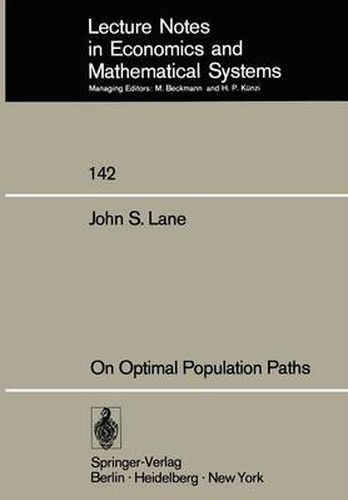Readings Newsletter
Become a Readings Member to make your shopping experience even easier.
Sign in or sign up for free!
You’re not far away from qualifying for FREE standard shipping within Australia
You’ve qualified for FREE standard shipping within Australia
The cart is loading…






This title is printed to order. This book may have been self-published. If so, we cannot guarantee the quality of the content. In the main most books will have gone through the editing process however some may not. We therefore suggest that you be aware of this before ordering this book. If in doubt check either the author or publisher’s details as we are unable to accept any returns unless they are faulty. Please contact us if you have any questions.
The overall purpose of this monograph is to integrate and critically evaluate the existing literature in the area of optimal joint savings population programs. The existing diverse presentations are all seen to be discussions within a unified framework. The central problem is to compare the desirability of alternative inter-temporal sequences of total savings and population sizes. Of critical importance is whether one regards persons as the fundamental moral entities or whether one takes Sidgwick’s viewpoint that something good being the result of one’s action is the baSic reason for dOing anything. The latter viewpoint is consistent with defining a complete social preference ordering over these alternative sequences. Since part of one’s interest is to evaluate the consequences of various ethical beliefs a com parative study of several such orderings is presented; in particular the Mill-Wolfe average utilitarian, and Sidgwick-Meade classical utilitarian) formulations. A possible problem with the social preference ordering approach is that the ordering may indicate the desirability of increasing the population size, if this increases the total amount of good, even though people may receive less than the welfare subsistence level of consumption. However, there are other ways of evaluating actions and, if persons are the fundamental moral entities, then perhaps these actions should be evaluated by their implications for the rights of individuals i. e. people Who are currently alive, people who one can predict will exist in the future (e. g.
$9.00 standard shipping within Australia
FREE standard shipping within Australia for orders over $100.00
Express & International shipping calculated at checkout
This title is printed to order. This book may have been self-published. If so, we cannot guarantee the quality of the content. In the main most books will have gone through the editing process however some may not. We therefore suggest that you be aware of this before ordering this book. If in doubt check either the author or publisher’s details as we are unable to accept any returns unless they are faulty. Please contact us if you have any questions.
The overall purpose of this monograph is to integrate and critically evaluate the existing literature in the area of optimal joint savings population programs. The existing diverse presentations are all seen to be discussions within a unified framework. The central problem is to compare the desirability of alternative inter-temporal sequences of total savings and population sizes. Of critical importance is whether one regards persons as the fundamental moral entities or whether one takes Sidgwick’s viewpoint that something good being the result of one’s action is the baSic reason for dOing anything. The latter viewpoint is consistent with defining a complete social preference ordering over these alternative sequences. Since part of one’s interest is to evaluate the consequences of various ethical beliefs a com parative study of several such orderings is presented; in particular the Mill-Wolfe average utilitarian, and Sidgwick-Meade classical utilitarian) formulations. A possible problem with the social preference ordering approach is that the ordering may indicate the desirability of increasing the population size, if this increases the total amount of good, even though people may receive less than the welfare subsistence level of consumption. However, there are other ways of evaluating actions and, if persons are the fundamental moral entities, then perhaps these actions should be evaluated by their implications for the rights of individuals i. e. people Who are currently alive, people who one can predict will exist in the future (e. g.